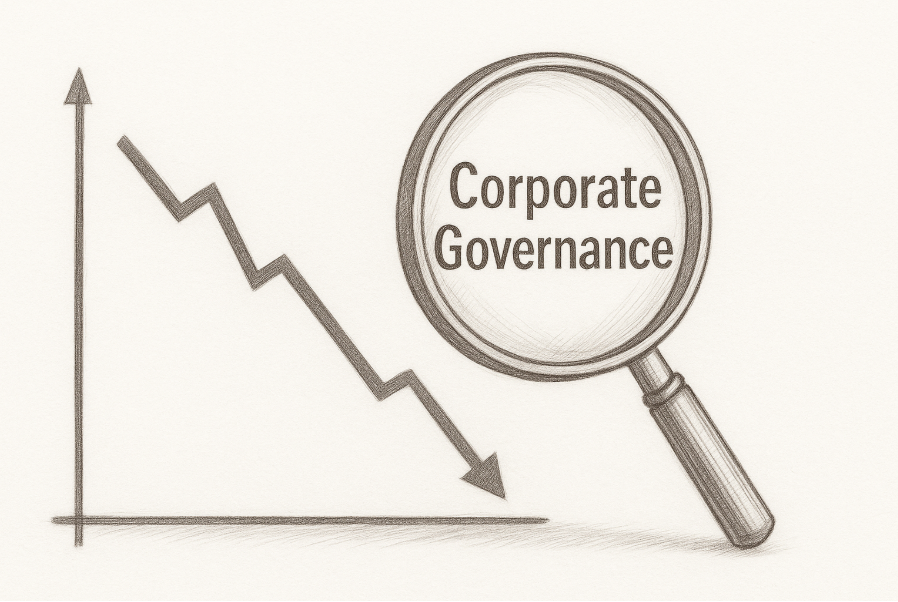Poor corporate governance can cost startups and scaleups up to 30% of their valuation – a price many founders underestimate. This article highlights, through studies and real cases, how lack of structure, transparency, and clear decision-making leads to major valuation discounts. It also shows how strong governance builds investor trust, improves fundraising opportunities, and drives value – and how Konsento helps companies implement these structures efficiently and digitally.
Introduction
Corporate governance may seem like a “big corporation topic”, but startups and scaleups in their early and growth stages pay a high price when they neglect leadership structures, decision-making processes, and control mechanisms. Investors quickly identify weak governance during due diligence – and respond with valuation discounts or stricter contract terms.
In the fast-paced early phase, where agility and lean structures prevail, governance is often seen as “bureaucracy”. Yet it is precisely at this stage that investors decide whom to trust. This article explores how large these discounts can be in practice, which governance deficiencies are most critical, and what founders and board members can learn.
Konsento provides proven solutions that help companies and boards strengthen governance while achieving efficiency gains and significant cost savings in corporate actions (e.g., capital increases).
Table of Contents
- What Does Corporate Governance Mean – and Why Does It Affect Company Value?
- Studies: Data on Valuation Discounts
- Mechanisms: Why Poor Governance Leads to Value Loss
- Case Studies: Lessons from Governance Failures
- Conclusion
- References
What Does Corporate Governance Mean – and Why Does It Affect Company Value?
Corporate governance refers to the system of rules and structures by which a company is directed and controlled. In a startup context, this means:
- Is there a functioning board or advisory committee?
- Are meetings held and minuted regularly?
- Is ownership and voting transparency ensured?
- Are there policies to prevent conflicts of interest and misuse of funds?
In early stages (Pre-Seed to Series A), such structures often don’t exist. Informal agreements and handshake decisions dominate. While this may seem efficient short-term, investors see it as a risk factor that directly lowers valuation. Studies show that solid governance reduces risks, improves access to capital, and enhances strategic decision-making[1].
Studies: Data on Valuation Discounts
Numerous studies show that poor governance can be costly:
- According to a global McKinsey investor survey, over 75% of respondents would pay up to 28% more for well-governed companies[2].
- Kaplan & Strömberg found that governance weaknesses like opaque cap tables, unclear roles, or lack of control rights systematically lead to lower pre-money valuations[3].
- A BCG study revealed that strong investor relations – as part of governance – can increase company value by 10–15%[4].
- In practice, VCs report applying discounts of up to 30% or demanding stricter liquidation preferences when governance issues are evident[5].
Investors increasingly view professional governance as a prerequisite for scalability and exit readiness.
Conclusion: valuation discounts range between 10% and 30% – a significant loss for founders and early-stage investors.
Mechanisms: Why Poor Governance Leads to Value Loss
Poor governance affects company value on several levels:
- Risk premiums in valuation models: uncertainty raises the cost of capital, lowering discounted cash flow valuations[6].
- Lower investor demand: weak governance discourages investors, reducing competition and pricing power.
- Negative signal for follow-on rounds: messy cap tables and unclear control deter institutional investors.
- Costly post-deal fixes: correcting governance gaps after closing causes friction and opportunity costs.
In competitive rounds, such issues can derail the entire deal.
Case Studies: Lessons from Governance Failures
Notable startup failures illustrate the damage poor governance can cause:
- WeWork (2019): Conflicts of interest and lack of CEO oversight caused valuation to plummet from USD 47 billion to under 10 billion – a 75% loss[7].
- Theranos (2018): No independent board, no formal records, no transparency. The once USD 9 billion startup collapsed[8].
- Zilingo (2022): Governance deficiencies uncovered before its Series D round led to funding failure and eventual liquidation[9].
These examples prove that even high-growth startups aren’t immune. Investor trust starts with governance.
Conclusion
Poor corporate governance can reduce a startup’s valuation by up to 30% – and that’s just the direct impact. Investors often also demand:
- higher liquidation preferences (e.g., 2× instead of 1×),
- stronger control rights,
- earn-out clauses tied to governance measures,
- strict bad-leaver rules.
The good news: startups that establish clear protocols, shareholder transparency, and competent boards early on improve funding prospects and trust among talent, customers, and acquirers.
Governance isn’t a constraint – it’s a value driver.
Start improving your corporate governance today:
Want to assess your governance level? Try our free 3-minute self-assessment.
Or discover how Konsento can strengthen your governance through a personalized, no-obligation demo.
References
- EVCA, Startup Governance Guidelines (2021).
- McKinsey & Company, Global Investor Opinion Survey on Corporate Governance (2002).
- Kaplan & Strömberg, Financial Contracting Theory Meets the Real World (2003).
- BCG, How Excellent Investor Relations Create Value (2014).
- SeedBlink, Red Flags in Early Stage Startups – 2024 Investor Report (2024).
- Koller et al., Valuation: Measuring and Managing the Value of Companies (Wiley, 2015).
- Gelles & Griffith, The Rise and Fall of WeWork (NYT, 2019).
- Carreyrou, Bad Blood (Knopf, 2018).
- Nishith Desai Associates, Governance Pitfalls in Southeast Asia’s Startup Landscape (2023).

